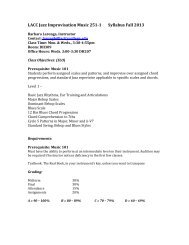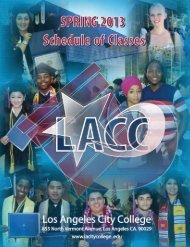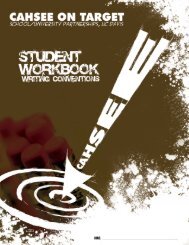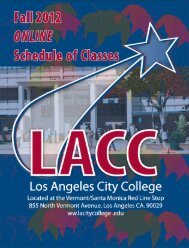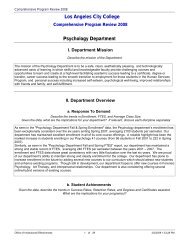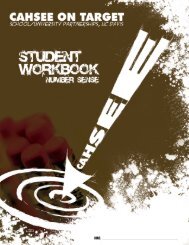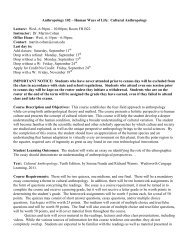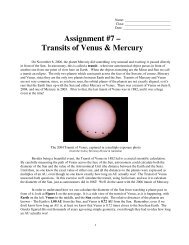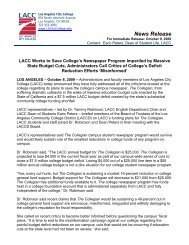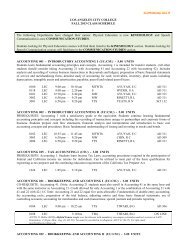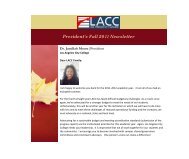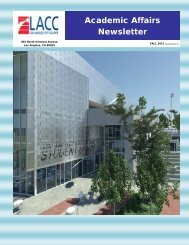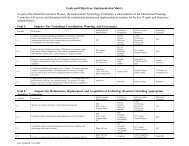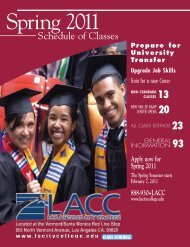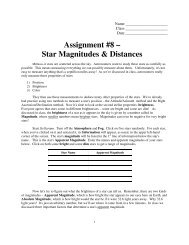LACC Vision & Mission Statements As Approved By - Los Angeles ...
LACC Vision & Mission Statements As Approved By - Los Angeles ...
LACC Vision & Mission Statements As Approved By - Los Angeles ...
You also want an ePaper? Increase the reach of your titles
YUMPU automatically turns print PDFs into web optimized ePapers that Google loves.
LOS ANGELES CITY COLLEGE 80TH ANNIVERSARY CATALOG 2008-2009<br />
tion of a selected microprocessor. Emphasis is placed on the architecture,<br />
instruction set, I/O interfacing, and typical applications of the selected devices.<br />
COMPUTER TECHNOLOGY 36<br />
Digital Devices and Circuits<br />
4 UNITS - (A)<br />
Prerequisite: Computer Technology 20 with a satisfactory grade.<br />
Covers digital integrated circuit devices such as registers, counters, encoder/<br />
decoder, multiplexer/demultiplexer. Memory devices, and programmable logic<br />
arrays. Laboratory emphasizes use of dual-trace oscilloscope.<br />
COMPUTER TECHNOLOGY 46<br />
Microprocessor Input/Output Devices<br />
4 UNITS - (A)<br />
Prerequisite: Computer Technology 30 with a satisfactory grade.<br />
Co-requisite: Computer Technology 48.<br />
Presents the theory and operation of input/output devices commonly used<br />
with microprocessor based systems. Includes the technologies used in disk<br />
drives, video displays, analog digital conversions, printers, and similar devices.<br />
Procedures for interfacing I/O systems are included.<br />
COMPUTER TECHNOLOGY 47<br />
Data Communications and Networking I<br />
4 UNITS - (A)<br />
An introductory course in data communications and networking for the technician.<br />
The student will install and test modems and networks on PC computer<br />
systems.<br />
COMPUTER TECHNOLOGY 48<br />
Microprocessor Systems<br />
4 UNITS - (A<br />
Prerequisite: Computer Technology 30 with a satisfactory grade.<br />
Co-requisite: Computer Technology 48.<br />
Examines selected topics in advanced microprocessor based systems, including<br />
advanced architectures, industrial control and robotics, networks,<br />
and multi user and multi processor systems. Laboratory is design oriented,<br />
and includes a project or term paper, field trips, seminars, and guest speakers.<br />
COMPUTER TECHNOLOGY 119<br />
Digital Home Technology Integrator Certification<br />
Preparation<br />
6 UNITS<br />
Prepares the student for the “CompTIA-DHTI+ Certification Exam”. Reviews<br />
principles of home technology systems, structured wiring, home computer<br />
networks design and installation, distributed audio/video systems, home<br />
lighting management systems, home communication systems, HVAC and<br />
water management, security and surveillance systems, home access control<br />
systems<br />
COMPUTER TECHNOLOGY 120<br />
Printed Circuit Board Design and Layout<br />
5 UNITS - (CSU)<br />
Prerequisite: Computer Technology 20 with a satisfactory grade.<br />
Advisory: Computer Technology 30.<br />
Presents the skills and techniques involved in the design and layout of printed<br />
circuit boards (PCB’s) for electronic devices and systems. Topics include<br />
component operation and characteristics, schematic capture, drawing generation,<br />
porting netlists to PCB layout software, and layout and routing of<br />
boards and generation of artwork.<br />
- 99 -<br />
COMPUTER TECHNOLOGY 121<br />
Printed Circuit Board Design Analysis<br />
5 UNITS - (CSU)<br />
Continues the work of the Computer Technology 120 by introducing component<br />
modeling, operating parameters, and circuit function simulation using<br />
SPCE and other simulation software. Topics include use of simulation software,<br />
virtual test equipment, analysis of circuit operation, modification of<br />
circuits to meet specifications and test criteria.<br />
COMPUTER TECH 185 Directed Study — 1 UNIT (CSU)<br />
COMPUTER TECH 285 Directed Study — 2 UNITS (CSU)<br />
COMPUTER TECH 385 Directed Study — 3 UNITS (CSU)<br />
Conference 1 hour per unit.<br />
These courses allow students in Computer Technology to pursue Directed<br />
Study on a contract basis under the direction of a supervising instructor.<br />
Credit Limit: A maximum of 3 units in Directed Study may be taken for credit.<br />
*Prerequisites: Computer Technology 1 or 12 and concurrent enrollment or<br />
completion of Computer Technology 20.<br />
COOPERATIVE<br />
EDUCATION<br />
Chair: Devon Werble, Dir.<br />
(323) 953-4000 ext. 2236 • AD 209<br />
PROGRAMS OFFERED<br />
Courses Only - No Degree/Certificate<br />
See Below<br />
Through Cooperative Education or “CO-OP ED,” students may earn<br />
college credit for their on-the-job work experience.<br />
CO-OP ED is designed to enhance the student’s academic and personal<br />
development. Educational objectives are carefully planned and<br />
coordinated with the student’s employer to provide realistic employment<br />
relationships.<br />
To be eligible, students are expected to:<br />
• Attend two (2) 2.5 hour seminars;<br />
• Be enrolled in seven (7) or more units (which may include CO-OP<br />
ED units) at <strong>LACC</strong> during regular Spring and Fall semesters;<br />
• Be currently employed and/or have arranged an internship through<br />
an employer; and<br />
• Complete a CO-OP ED application and submit the CO-OP ED agreement,<br />
signed by the employer.<br />
For students working in their major or a related field, a maximum of four<br />
(4) units may be earned per semester for a total of sixteen (16) units<br />
maximum in CO-OP ED. The same CO-OP ED course may be repeated<br />
for a maximum of four (4) semesters. Students may enroll in one (1)<br />
section number and a maximum of four (4) CO-OP ED units per semester.<br />
<strong>LACC</strong> COOPERATIVE EDUCATION (CO-OP ED) COURSES<br />
Vocational Disciplines Offering Co-op Ed Experience<br />
Note: Students in the following declared majors may enroll under the<br />
following disciplines: Business, Cinema, CAOT, Music, Television<br />
Non-Vocational Disciplines Listed for Cooperative Education<br />
Note: In accordance with the State Chancellors’ guidelines, students may<br />
enroll in general Co-op Ed courses under the state approved top code.



